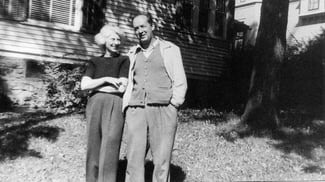Encountering Nabokov in Epistolary Form
 Vladimir Nabokov lived out the final decades of his life in Europe and died in Switzerland in 1977, at which time an obituary* in The New York Times described him as a writer with “technical brilliance and mastery of form,” yet one who also exuded a “sense of flippancy [with a] . . . penchant for parody.” Yet nearly up to his death, he wrote letters to his wife that described his travels, his thoughts on writing, and the complications of returning to the Russian language. After all, Nabokov wrote his most famous works in English. Yet when we think about love letters drafted by Nabokov, most of us think first about Lolita.
Vladimir Nabokov lived out the final decades of his life in Europe and died in Switzerland in 1977, at which time an obituary* in The New York Times described him as a writer with “technical brilliance and mastery of form,” yet one who also exuded a “sense of flippancy [with a] . . . penchant for parody.” Yet nearly up to his death, he wrote letters to his wife that described his travels, his thoughts on writing, and the complications of returning to the Russian language. After all, Nabokov wrote his most famous works in English. Yet when we think about love letters drafted by Nabokov, most of us think first about Lolita.
An epistolary novel is one written in the form of letters. For those of us who have read Lolita, we know that this novel is, in many ways, a form of correspondence between the protagonist, Humbert Humbert, and his reader (or, as the case may be, his confessor of sorts). As we mentioned, Nabokov became particularly well-known—in some cases revered, in other cases despised—for the 1958 publication of his novel Lolita. Yet don’t let the plot of Lolita convince you that you’ve already encountered Nabokov’s letters. To be sure, you’ll be surprised and delighted to move away from the novelist’s fiction and into his musings on less-traveled American roads.
Translating Nabokov’s Travel Letters
 When Nabokov wrote to Véra, he didn’t write in English. Instead, all of his letters were written in Russian, and they’ve been translated by Olga Voronina and Brian Boyd. Do you want to read a short excerpt for yourself? When news of the edited collection began circling, The New Yorker published an article** that reprinted some of the translated letters from various stops on a literary lecture tour in the U.S., including the following:
When Nabokov wrote to Véra, he didn’t write in English. Instead, all of his letters were written in Russian, and they’ve been translated by Olga Voronina and Brian Boyd. Do you want to read a short excerpt for yourself? When news of the edited collection began circling, The New Yorker published an article** that reprinted some of the translated letters from various stops on a literary lecture tour in the U.S., including the following:
“Arrived here, on the Florida border, yesterday around 7 p.m. and leave for Tennessee on Monday morning . . . . The college, with a charming campus among pines and palms, is a mile out of town. It is very Southern here. I took a walk down the only big street, in the velvet of the twilight and the azure of the neon lamps, and came back, overcome by a Southern yawn . . . .”
Throughout his travels, and throughout his correspondence, Nabokov didn’t lose the sense of play that came to define his writing. A final excerpt from a stay in St. Paul, Minnesota demonstrates his penchant for humor:
“I love you, my sweetheart. Try to be cheery when I come back (but I love you when You’re low, too) . . . . Cotton woolly hotel, rain outside the window, a Bible and a telephone book in my room: for the convenience of communication with the Heavens and the office.”
If you want to read more (as we suggest you do!), you’ll need to pick up a copy of Vladimir Nabokov's letters for yourself. We guarantee it will make an excellent addition to your bookshelf.









